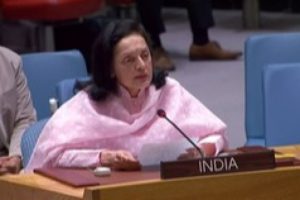Higher education in India has become a topic of lost glory. One wonders where all those people have gone who left their mark on lives of young people. One such outstanding person was Mother Colmcille, an Australian Nun teaching English at Loreto College, Calcutta. It is people like her who made Loreto education what it is today. Her students affectionately called her “Colly”.
‘O lente, lente currite noctis equui!’ ~ “Gallop slowly, slowly, you horses of the night … the stars still move, time still runs, the clock will strike .. the devil will come and Faustus must be damned!” That deep, rich voice still resounds in my ears after half a century. The anguish of Dr Faustus became very real, very moving when Mother Colmcille taught Marlowe to the English honours class.
The short, lively Australian nun, Mother Colmcille was a teacher par excellence, a scholar of the highest order and a friend for life. Born in Melbourne, she came to India in 1926, at the tender age of 24. Despite her youth, she held a double MA in English and History from Melbourne University. She was passionate about education, and also held a degree in Education. Inspired by the ideals of its founder, Mary Ward, she joined the Loreto order. The order’s mission of education appealed to her.
Colly made India her home, visiting Australia only once, in her later years. She loved Bengal and the rich Bengali culture. She was fluent in Bengali and even taught using Bengali at St Mary’s Convent, Entally. Tagore was her favourite ~ every year a Tagore play or dance drama would be performed in the college during her time.
An extremely erudite and sensitive teacher, she loved her students like her children. She aroused their intellectual curiosity, encouraged their thirst for knowledge and loved arguments on any subject from politics to films. She had strong likes and dislikes. She would never agree to the 1857 revolt being called the First War of Indian Independence ~ she called it the Sepoy Mutiny. Napoleon was her favourite and she would defend him adamantly.
She loved the Romantic poets, particularly Coleridge and Keats, and afternoons would be spent in poetry reading sessions with her. I can still recall the supernatural atmosphere of Christabel. Her reading of Kubia Khan made Xanadu real and The Eve of St Agnes touched our young hearts. Through her, we came to be steeped in English literature. Completing the syllabus or appearing for examinations were never the only objectives for studying. She introduced us to Francis Thompson and The Hound of Heaven, Hillaire Belloc was another poet whom she liked. She would often read his poems to us.
Some people may still recall several articles on old Calcutta, published by The Statesman in the late 1950s and early sixties; the articles, extremely well-written and researched were by one E. T Hashok. The writer was none other than other than Mother Colmcille, writing under her pen name, which was really the Bengali word “etihashok’ meaning ‘historian’. The then Statesman Editor Mr Lindsay Emerson wanted her to write a book on the history of Calcutta.
In 1962, to commemorate 120 years of Loreto education in India, she wrote the history of the Loreto order in India; this was published under the title of “First the Blade”. This book is, in effect, the history of Calcutta, of Bengal and of the education of women in this part of the world. She also designed the library of the college when the new library/college building was built.
She was a great friend of Mother Teresa at Loreto. Later they followed different paths to serve God and mankind but their friendship continued. She wrote very warmly of Mother Teresa in her book “First the Blade.”
She was very fond of my younger sister Nisha. Nisha studied history and english honours in the college. She would often relate to us interesting anecdotes about Colmcille’s classes. I wish Nisha was here today to tell us some of them.
My youngest sister, Asha, had an interesting conversation with Mother Colmcille. In Asha’s own words: “Since I wanted to study Economics honours I took up mathematics as one of my subjects. Unfortunately history could not be combined with Maths, so I had to give up history. Mother Colmcille was teaching history. She saw that I was not in the class, and she sent for me. We took a walk along the long corridor from the old building, where the staff room was, to the new building where our classes were held. She just would not hear of my not studying history.
She said, “You would be the only uneducated person in your family”. She also told me how important history was. At the end of the walk I had agreed to take up history and give up Maths. She would never hesitate in pointing out what was wrong in whatever you were doing. She even admonished girls in class for wearing too many bangles, saying that was a very childish thing to do. I never regretted having taken up history, as it helped me even in becoming an economist. Of course I had to struggle to learn Maths on my own. She was a very good history teacher and loved the subject.”
During the last few years of her life, when her eyesight began to fail, she would move about the college with a big optical glass, trying to find a familiar face. She was writing even then ~ she was writing the biographies of women saints.
In the end when she was not so agile, a young nun affectionately looked after her. Though her mind was failing, she would respond to the prayers of the sister, whose touch and gentle voice brought peace to the gradually fading mother. The sister does not want to be named, though she still remembers Mother Colmcille with great affection. She was with Mother Colmcille, praying till her last moment.
On 13 December 1994 at the age of 92, Mother Colmcille left this world to be with her god. It was the end of an era.
With Mother Colmcille a bit of the old world has gone; gone is also a bit of the Loreto tradition ~ a teacher who taught her students and leaves her mark for good. Her students will always have the everlasting gift of knowledge which she gave. She reminds me of Shelley’s Adonais, one of her favourite poems:
“The soul of Adonais, like a star, Beacons from the abode where the eternal are”.
The writer is a retired Reader and Head of the Economics department, Loreto College.











